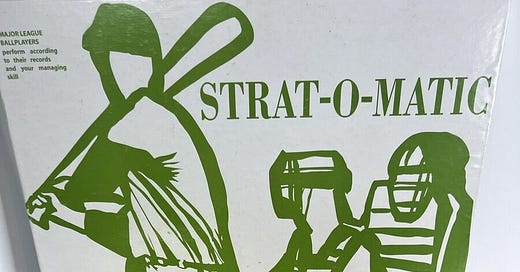Strat-O-Matic and All-Star Baseball
I noticed something odd the other day.
I had a chance to buy a copy of Strat-O-Matic’s Founder’s Edition reprint a few months back. This is an exact copy of the Strat-O-Matic baseball game as it was originally sold back in 1961.
Now, if you know your Strat-O-Matic history, you know that the original version didn’t include any full teams. Instead, it included 80 all stars selected from all 16 teams in the Major Leagues.
But, as it turns out, there are a few other bizarre features of the game that you might not have known about.
For example, there are no fielding positions listed on the put outs. The putouts are simply listed as outs, with no reference to which player made the putout and which player made the assist.
Additionally, there’s a bizarre system for drafting the player cards, the likes of which I’ve really never seen before in a game.
You really need to see that part to understand it:
And on and on it goes. In fact, this part of the instructions is longer than the instructions on how to actually play the game.
Anyway, I thought all of this seemed familiar. And, sure enough, it is.
This comes from an old eBay photo from a 1953 version of Ethan Allen’s All-Star Baseball:
It’s not a perfect match, sure, but it sure is close. It seems to me that Hal Richman may have remembered the system he played with in the old All-Star Baseball game (which, if I remember right from Strat-O-Matic Fanatics, he had when he was about 9 years old), and that he simply adapted that system for his own game.
It also seems that All-Star Baseball didn’t provide fielder information for putouts or assists:
This comes from that same 1953 game that was up for auction.
Now, I don’t mean to say with this that Hal Richman copied Strat-O-Matic from All-Star Baseball. Actually, nothing could be further from the truth. Strat-O-Matic is a far more complex game for multiple reasons.
However, it seems that the basic structure of the game really owed a lot to All-Star Baseball. At any rate, Strat in its original format had a lot more in common with Ethan Allen’s game than with APBA or National Pastime.








